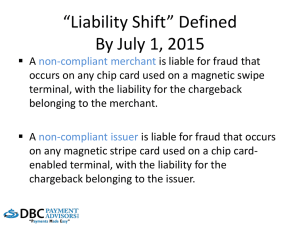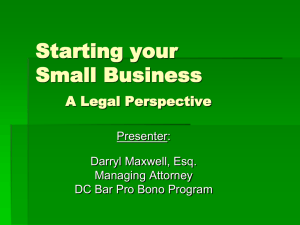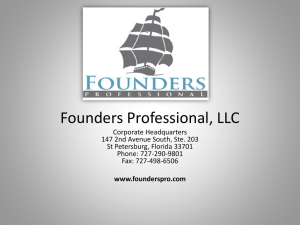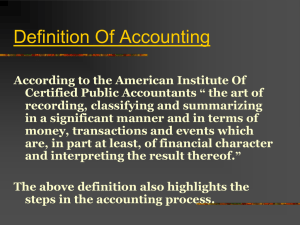Business Insurance
advertisement
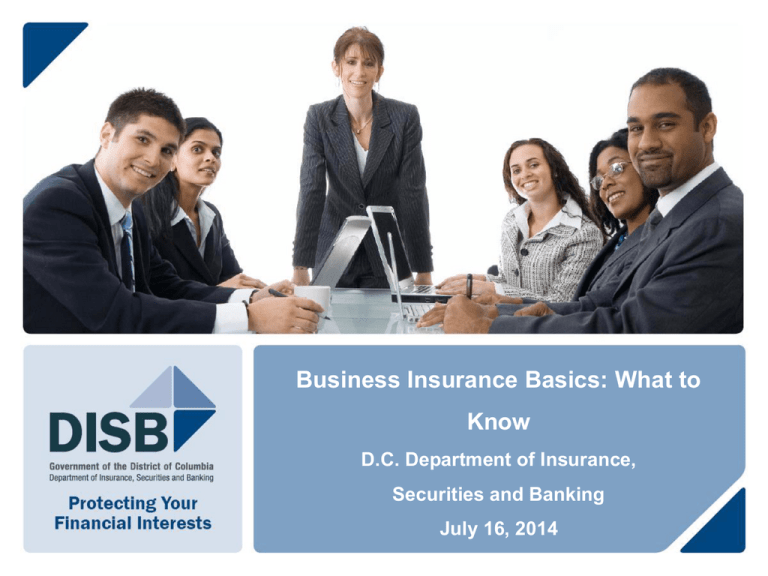
Business Insurance Basics: What to Know D.C. Department of Insurance, Securities and Banking July 16, 2014 Presentation Overview 1. Workers’ Compensation Insurance/Employers’ Liability 2. Business Property and Liability Insurance 3. Auto Insurance for Commercial Vehicles 4. Group Health and Group Disability Insurance 5. Group Life insurance 6. Home-Based Business Insurance 2 | Business Insurance Basics: What to Know Workers’ Compensation Insurance Most Workers’ Compensation policies offer 2 types of coverage • Workers’ compensation coverage protects a business owner from claims by employees who experience a workrelated injury or illness – either sustained on business premises or due to business operations. • Employers’ Liability coverage protects the employer against work related injuries not covered under workers’ compensation; such as, an obligation to pay damages because of a wrongful death claim, suits alleging negligence or failure to provide safe working conditions Business Insurance Basics: What to Know Workers’ Compensation Insurance • A workers’ compensation policy covers the employee’s medical expenses, rehabilitation costs , lost wages, death, and survivor payments. • Business owners, independent contractors, domestic employees in private homes, farm workers and unpaid volunteers are usually exempt from workers’ compensation eligibility. • When you first purchase workers’ compensation insurance, the rate will depend on your payroll and your industry. After a few years, the actual experience of your company will affect the premiums you pay. • In the District, most businesses are required to carry workers’ compensation insurance for their employees. You will need a separate workers’ compensation policy for this type of coverage. Business Insurance Basics: What to Know Business Property and Liability Insurance Property insurance Property insurance protects business owners from losses due to damage to physical space or equipment, and as a result of theft. For insurance purposes, a business’ property includes the physical building in which it resides, as well as its other assets. All of the following, owned or leased, can be considered business property: • • • • • • • • The actual building Inventory, furniture, machinery, equipment and supplies Computers and other data processing equipment Valuable papers, books and documents Artwork and antiques Television sets, VCRs, DVD players, satellite dishes Signs, fences and outdoor property not attached to a building Non-tangible items such as trademarks and copyrights Business Insurance Basics: What to Know Business Property and Liability Insurance There are three types of property insurance coverage: • • • Basic form, which includes losses resulting from a fire, lightning, windstorm, hail and explosion, plus the cost of removing property to protect it from further damage. Broad form, which includes basic plus extended coverage for other types of perils, such as a roof collapse (e.g. caused by snow or ice), riot and civil commotion, etc. Special form, which includes basic and broad, and covers all direct physical losses except conditions specifically excluded as listed in the policy. With property insurance you can buy either actual cash value (ACV) or replacement cost insurance (RPL). (RPL – Depreciation= ACV) Business Insurance Basics: What to Know Business Property and Liability Insurance Liability Insurance • If your company, product, work, employee or anything else associated with your company causes physical injury to a client or guest or damages their property or belongings, liability coverage provides compensatory protection • Liability insurance, also called Commercial General Liability (CGL), covers four categories of events for which you could be held responsible: – Bodily injury; – Damage to others’ property; – Personal injury, including slander, libel, and false or misleading advertising. – Medical payment & tenants legal liability (for those who rent or lease their work space). – Products & completed operation ( deck builder forgets to secure a railing) – Fire legal liability (employee’s space heater damages the landlord’s building) – General liability ( Customer tripping on a tattered carpet) . Business Insurance Basics: What to Know Business Property and Liability Insurance There are three types of legal damages people may sue you for that are typically covered by a CGL policy: • • • Compensatory damages: financial losses suffered by the injured party and future losses they may suffer resulting from an injury they claim. General damages: non-monetary losses suffered by the injured party, such as “pain and suffering” or “mental anguish.” Punitive damages: additional penalties and charges a defendant must pay. (Coverage availability can be regulated by state statute) Standard liability insurance does not protect a business against: • • • Claims from sexual harassment, wrongful termination of employees, failure to employ or promote, or race and gender lawsuits. Claims related to operating an automobile or truck. Professional Liability insurance — or Errors and Omissions insurance Business Insurance Basics: What to Know Business Property and Liability Insurance Business Interruption/Continuation or Business Income Insurance covers the loss of income that a company suffers after a catastrophe or disaster while the establishment is being rebuilt. It is designed to put the business back in the same financial position if no loss had occurred. The following are typically covered under a business interruption insurance policy: • Profits- Profits that would have been earned (based on prior months' financial statements); • Fixed Costs- Operating expenses and other costs still being incurred by the property (based on historical costs); • Temporary Location- Some policies cover the extra expenses for moving to, and operating from, a temporary location; • Extra Expenses- Reimbursement for reasonable expenses (beyond the fixed costs) that allow the business to continue operation while the property is being repaired. • This type of coverage cannot be bought separately, but can be added on to the business ’property insurance policy or a comprehensive package policy. Business Insurance Basics: What to Know Business Property and Liability Insurance Business Owner’s Policy (BOP): A Package Solution • Many small business owners purchase a business package policy called a “BOP” – a business owner’s policy. A BOP typically includes property insurance, business interruption/continuation insurance, crime, and liability insurance. • Often it is a less costly option for small businesses than buying a set of individual policies. Many insurers customize BOPs for specific types of businesses. • However, a BOP does not cover professional liability (liability claims arising from wrongful practice by professionals), auto insurance, workers’ compensation, health or disability insurance – all of which need to be purchased separately. Business Insurance Basics: What to Know Business Property and Liability Insurance Business Owner’s Policy (BOP): A Package Solution • Not all businesses qualify for a BOP. For example, a factory or jewelry store would probably not qualify for a BOP. Those businesses – because of their unique risks – usually require more customized coverage than what’s included in a standard BOP. • A home-based business or a company with only a few employees may start out with a BOP and then expand its coverage as it grows. Business Insurance Basics: What to Know Commercial Auto Insurance Commercial Auto Insurance All motorized vehicles, whether used for personal or business purposes, need auto insurance. Automobile liability insurance is usually mandatory and covers medical expenses for injured persons and damages to the property of other individuals as a result of a motor vehicle accident caused by the insured’s negligence. • While the types of coverage provided by personal and commercial auto insurance policies are essentially the same, there are important distinctions. Typically, commercial auto insurance policies have higher liability limits, for example $1 million. They also may have provisions that cover rented and other non-owned vehicles, including employees’ cars driven for company business. • Several factors related to ownership and use of vehicles determine whether a personal or commercial policy is appropriate. These include: • Who owns or leases the vehicle – you individually or the business as an entity • Who drives the vehicle – you or your employees • How the vehicle is principally used – for example, transporting people, delivering packages or carrying hazardous materials Business Insurance Basics: What to Know Group Health & Disability Insurance Commercial Health Providing health insurance for employees is the most expensive benefit offered by employers. It is also a useful benefit to help attract and retain good employees. The Affordable Care Act requires that many businesses offer health insurance to their employees or pay a fine. Health care reform includes several benefits for small business owners. Small business owners may be eligible for a 50% tax credit if they choose to cover their employees under a health insurance plan or a 35% for small tax exempt employers. This tax credit is available to small businesses that have less than 25 full time employees. The credit is available for eligible employers for two consecutive taxable years. To be eligible for the credit the small employer must pay premiums on behalf of employees enrolled in a qualified a Small Business Health Options Program or qualify for an exemption to this requirement. Business Insurance Basics: What to Know Group Health & Disability Insurance Furthermore, all small businesses that have 50 employees or less are exempted from all employer mandates to provide coverage in the new reform law. The District of Columbia DC Health Link has made it easier for a small business to offer expanded health insurance options for employees without an undue administrative burden. DC Health Link also allows small businesses to obtain competitive insurance rates and not be subjected to inflated prices for the same coverage offered to larger companies. Business Insurance Basics: What to Know Group Health & Disability Insurance Another health related insurance option for business owners to consider is disability insurance. There are two types of disability insurance that cover your employees should they become ill and unable to work: • Short term disability, which covers a portion of the employees salary for a shorter period, usually 3-6 months following a disability. The specific time period and percentage of salary replaced varies by policy. Generally short term disability follows a period of sick days paid at 100% of salary. • Long term disability, which typically begins after a employee is disabled and unable to work for at least 6 months. Long term disability can extend for a number of years or until the employee reaches age 65 depending on the terms of the policy. Business Insurance Basics: What to Know Group Life Insurance Group Life Insurance Some small business owners offer group life insurance to employees. Group life insurance can be part of an employee benefit plan that is paid for by the employer or a voluntary offering, whereby the employee pays for the coverage. • For policies paid by a business owner, the benefit can often be equivalent to a full year’s salary. These types of policies can be viewed as an added benefit or “supplemental” to other life coverage an employee may already have. • If an employee wants additional coverage on top of what an employer is willing to purchase, for double or triple times his/her salary as an example, he or she may have to pay for it individually instead. • Group life insurance policies tend to be less expensive than those purchased individually based on the fact that many group policies are only effective while an employee within the group is employed at that particular company. Most group life insurance is sold on a term basis. Term life insurance pays a death benefit if the policyholder passes away within a specified time period. Business Insurance Basics: What to Know Home-Based Business Insurance Home-Based Business Insurance • • • Home-based businesses – those exclusively run from a home and no other location – comprise roughly half of all U.S. businesses and generate a huge amount of economic activity. Home-based businesses – like all businesses – should be properly insured to protect their assets and their owners against certain risks. Often, homebased businesses are underinsured – a fact their owners discover after an incident occurs when they realize the insurance they have is inadequate to address the magnitude of the problem. If your home-based business has employees, most states will require you to purchase workers’ compensation insurance. Business Insurance Basics: What to Know Home-Based Business Insurance • Many home-based business owners believe that their homeowners or renters insurance policy will adequately cover their home-based business. However, that coverage is rarely enough. For example, most homeowners insurance policies limit coverage due to damage or loss of business property to $2,500 in the home and $250 away from their home. – You may be able to add a simple endorsement to your existing homeowners insurance policy that can increase the standard coverage for business equipment. – Some types of home-based businesses may be able to purchase a homeowners liability endorsement to protect you in case someone gets hurt in your home in the course of conducting business. – In-home business policies – Business Owner’s Policy (BOP) – Business Interruption/Continuation Insurance Business Insurance Basics: What to Know Be an Educated Insurance Consumer All Insurance Consumers Should: • Shop Around — Examine rates from several companies, making sure to compare plans that offer the same coverage. • Protect Yourself — Stop. Call. Confirm. disb.dc.gov (202)727-8000 • Review Annually — Each year, check your policies to make sure they continue to meet your changing needs. Business Insurance Basics: What to Know
